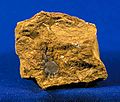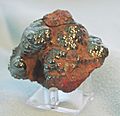Sienna facts for kids
Quick facts for kids Sienna |
|
|---|---|
| Colour coordinates | |
| Hex triplet | #882D17 |
| sRGBB (r, g, b) | (136, 45, 23) |
| CMYKH (c, m, y, k) | (0, 67, 83, 47) |
| HSV (h, s, v) | (12°, 83%, 53%) |
| Source | ISCC-NBS |
| B: Normalized to [0–255] (byte) H: Normalized to [0–100] (hundred) |
|
Sienna is a special kind of earth pigment. It gets its name from the city of Siena in Italy. This is where it was first made a long time ago.
Sienna is made from natural minerals found in the ground. It contains iron oxide and manganese oxide. When it's found naturally, it's a yellow-brown color called raw sienna. If you heat it up, it changes to a reddish-brown color. This is called burnt sienna.
Sienna is one of the oldest colors used by people. You can find it in many ancient cave paintings! Since the Renaissance, artists have used it a lot. It's a very popular brown color for paintings. The word sienna was first used for a color in English in 1760.
Contents
What Makes Earth Colors?
Sienna is an "earth color," just like yellow ochre and umber. These colors come from special clays found in the ground. Sienna clay has a lot of iron oxide, which is also called limonite. This gives it its yellowish color.
Raw sienna also has a little bit of manganese oxide. This makes it a bit darker than ochre. When raw sienna is heated, the water inside the iron oxide dries out. This changes it into a reddish material called haematite. That's why burnt sienna is reddish-brown!
Sienna is usually lighter than raw umber. Umber also has iron oxide, but it has more manganese. This makes umber a greenish-brown or dark brown. When umber is heated, it becomes burnt umber, which is a very dark brown.
-
Limonite is a clay with iron oxide. It gives sienna its color.
-
Haematite is formed when limonite is roasted. It makes the color more reddish.
A Look at History
People have used sienna pigment for a very long time. The ancient Romans knew about it and used it. They found it near a place called Arcidosso in Italy. They called it terra rossa (red earth) or terra gialla (yellow earth). Sometimes they just called it terra di Siena.
During the Renaissance, a famous writer named Giorgio Vasari wrote about painting techniques. He mentioned sienna as terra rossa. From the 1500s to the 1800s, sienna was a common brown color for artists. Famous painters like Caravaggio (1571-1610) and Rembrandt (1606-1669) used it. They loved using earth colors like ochre, sienna, and umber in their art.
By the 1940s, the places in Italy where sienna was found were almost empty. Today, much of the sienna comes from the Italian islands of Sardinia and Sicily. You can also find large amounts in the Appalachian Mountains in the USA. It's often found near iron deposits there. Some sienna is still made in France, too.
In the 1900s, scientists started making pigments in labs. They used man-made iron oxide instead of natural earth. Paint tubes now tell you if the color is natural or made in a lab. PY-43 means natural raw sienna. PR-102 means natural burnt sienna.
-
Giorgio Vasari used earth colors like sienna in his paintings. This fresco is in the Palazzo Vecchio in Florence.
-
Rembrandt used sienna, ochre, and umber to create his rich brown colors.
Different Shades of Sienna
There isn't just one exact color for sienna. Different companies and countries have their own versions. The color box at the top of this page shows one example of sienna.
Raw Sienna
| Terra di Siena naturale, or raw sienna (Italian) | |
|---|---|
| Colour coordinates | |
| Hex triplet | #965434 |
| sRGBB (r, g, b) | (150, 84, 52) |
| CMYKH (c, m, y, k) | (0, 44, 65, 41) |
| HSV (h, s, v) | (20°, 65.3%, 58.8%) |
| Source | Ferrario 1919: Cartella colori, colour 69 |
| B: Normalized to [0–255] (byte) H: Normalized to [0–100] (hundred) |
|
Raw sienna is a natural earth pigment that is yellowish-brown. It's mostly made of iron oxide hydroxide. The color box shows what it looks like in its natural state. It has a lot of iron oxide and a small amount of manganese oxide.
This pigment is also known as yellow ochre, yellow earth, or limonite. On paint labels, natural raw sienna is called PY-43. The box here shows a raw sienna color from an old Italian color list from 1919.
Burnt Sienna
| Terra di Siena bruciata, or burnt sienna (Italian) | |
|---|---|
| Colour coordinates | |
| Hex triplet | #623034 |
| sRGBB (r, g, b) | (98, 48, 52) |
| CMYKH (c, m, y, k) | (0, 51, 47, 62) |
| HSV (h, s, v) | (355°, 51%, 38.4%) |
| Source | Ferrario 1919: Cartella colori, colour 77 |
| B: Normalized to [0–255] (byte) H: Normalized to [0–100] (hundred) |
|
Burnt sienna is a rich reddish-brown color. It's made by heating raw sienna. This heating process changes the iron oxide inside, making it turn into haematite. This gives it its deep red-brown color.
This pigment is also called red earth or red ochre. On paint labels, it's known as PR-102. This version of burnt sienna comes from the Italian Ferrario 1919 color list. The name burnt sienna was first used in English in 1853.
Dark Sienna (ISCC-NBS)
| Dark sienna | |
|---|---|
| Colour coordinates | |
| Hex triplet | #3C1414 |
| sRGBB (r, g, b) | (60, 20, 20) |
| CMYKH (c, m, y, k) | (0, 67, 67, 76) |
| HSV (h, s, v) | (0°, 67%, 24%) |
| Source | ISCC-NBS |
| B: Normalized to [0–255] (byte) H: Normalized to [0–100] (hundred) |
|
This color box shows a shade called dark sienna. This specific color comes from the ISCC-NBS color list. You might have seen a similar dark sienna paint used by Bob Ross on his TV show, The Joy of Painting.
Sienna (X11 Web Color)
| Sienna (X11 web colour) | |
|---|---|
| Colour coordinates | |
| Hex triplet | #A0522D |
| sRGBB (r, g, b) | (160, 82, 45) |
| CMYKH (c, m, y, k) | (0, 49, 72, 37) |
| HSV (h, s, v) | (19°, 71.9%, 62.7%) |
| Source | X11 |
| B: Normalized to [0–255] (byte) H: Normalized to [0–100] (hundred) |
|
The web color sienna is a specific shade used for websites and computer screens. It's part of the X11 colours list.
See also
 In Spanish: Siena (color) para niños
In Spanish: Siena (color) para niños
 | John T. Biggers |
 | Thomas Blackshear |
 | Mark Bradford |
 | Beverly Buchanan |






